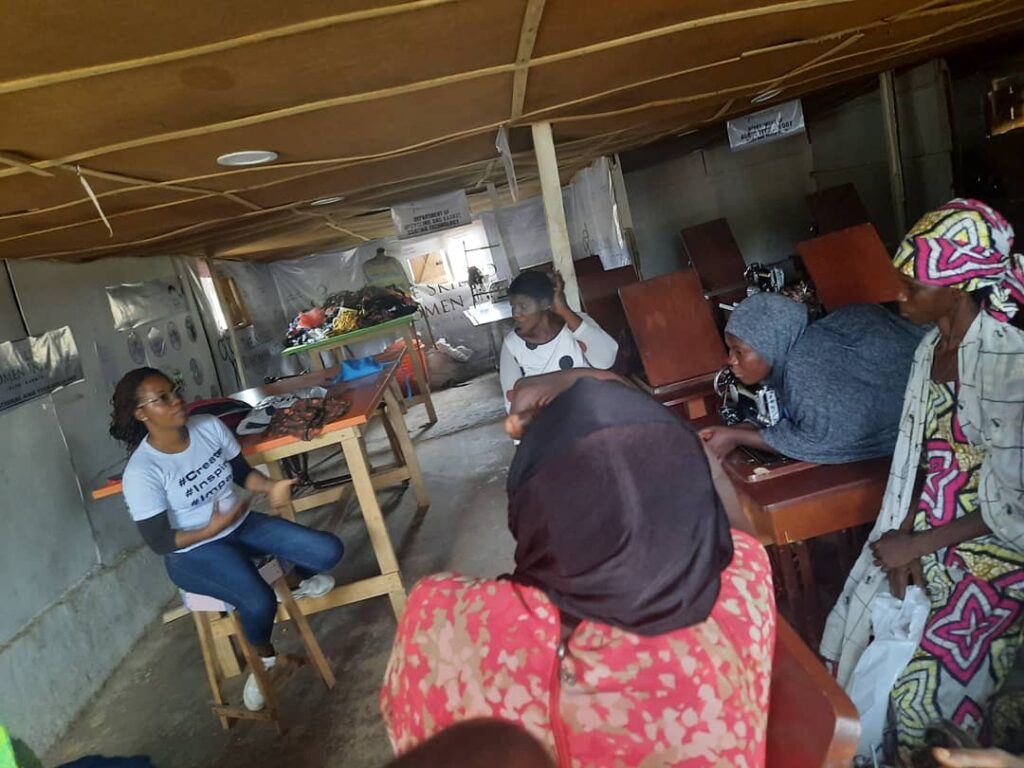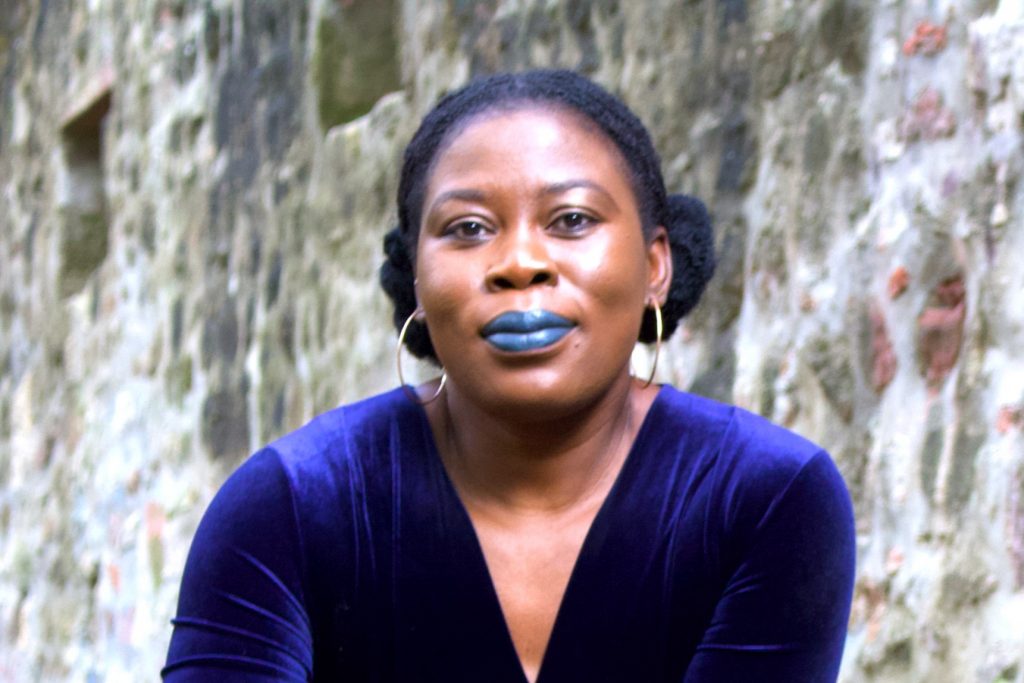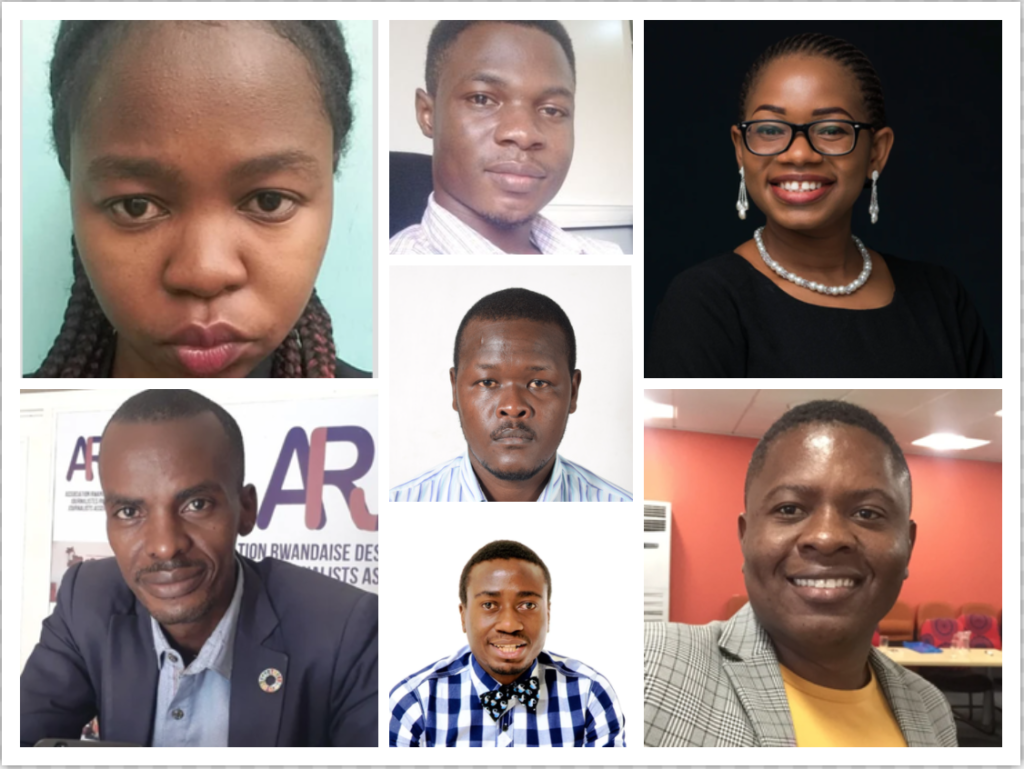Chika Mefor writes on a skills-acquisition project training for Internally Displaced Persons (IDPs) to run small businesses and live outside the displacement camp.
The life of an average Internally Displaced Person (IDP) in Abuja, Nigeria’s capital city is characterized by acute poverty and lack. A Protection Monitoring Report on IDP Sites in the Federal Capital Territory (FCT) revealed that as of 2015, there were about 20,659 IDPs in Abuja. This number has more than doubled in half a decade, signifying an alarming level of demographic imbalance in the country.
Though no official records exist, there are at least about 34 Camps in the FCT which the FCT Emergency Management Agency (FEMA) insists are ‘illegal’. This has therefore made help from the government difficult.
Several reports have suggested that many displaced persons who fled the Northeast due to insurgency and arrived in the FCT in 2014, survive on goodwill from the public and non-governmental organizations. Since the government has failed to provide adequate infrastructure and resources for their welfare, the IDPs thus lack potable water and grapple with poor living conditions.
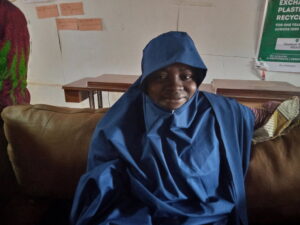
The same is the case in Kabusa Camp, also in the FCT where Zara Musa, a displaced person from Baga in Borno State, the Northeast of Nigeria, resides.
Zara and her family had escaped the attack of the Boko Haram sect on her village and had arrived in Abuja, the capital city of Nigeria in 2014.
“We trekked from Bama to a neighbouring village. My father who is working here in Abuja was able to send us money to come down with. Later, my husband came to join us here in Kabusa Camp. We were uprooted from our land and when we came here, we had to start life afresh,” she narrated sadly.
Starting life afresh was not easy for Zara. She was a housewife in Bama where her husband who is a farmer provided for her and her children. But in Abuja, getting lands to cultivate proved difficult so Zara’s husband had to make do with petty jobs, which could barely feed the family.
CLICK TO SEE OTHER SOLUTIONS REPORT IN WEST AFRICA: Solutions Report Monitor
Life became even more difficult as Zara and her family had to live in makeshift tents made of cellophane and tarpaulin, a far cry from the well-structured houses they had left behind in Bama. During the hot seasons, the interior of the tents is always too hot and during the rainy seasons, the roof leaks. Due to their living conditions, the camps are easily a flashpoint for cholera outbreak and other diseases.
Zara and other displaced persons in Abuja can hardly afford medical services when they get ill. Many pregnant women hardly attend antenatal services and seek the help of traditional birth attendants when it is time to deliver.
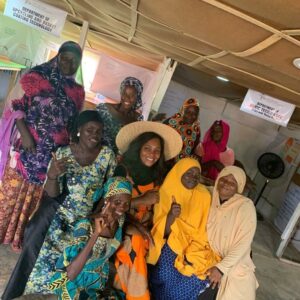
Skill acquisition programme for the women
For Zara, it seems there was no help in sight, until a Non-governmental Organization (NGO), The Skilled Women Initiative (TSWINI), started a skill acquisition training in the different IDPs camps on various skills.
“When they came and decided to train us, I was willing to learn because I wanted to better the lives of my family. For more than six years that we have stayed in the camp, I didn’t achieve anything, until they came. They trained us in so many skills and now our lives have changed,” Zara continued as she smiled heartily and adjusted her veil.
“They asked us the skills we would love to learn, and started teaching us; crochet, textile upcycling, liquid soap making, sewing and other skills. Before then, we were not doing any business,” she continued.
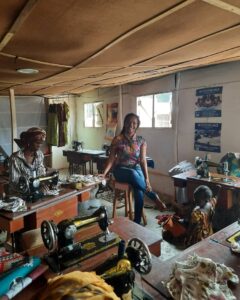
“Now, I can sew, I can make liquid soap, I can also work on crochet and textile upcycling,” Zara revealed as she reeled out her skills happily.
The mother of three said with the skills she has acquired, she has been able to not just help in the feeding of her family, but has also been able to afford money to send her children to school, a feat she said she could not even achieve when she was in Bama.
Apart from doing their individual jobs of sewing and other businesses in the camp, Zara and the other women get referrals for jobs from the NGO which she said had not only kept them busy but also earned them money.
Hasfat Ahmed, another displaced person who is participating in the programme revealed that apart from earning money for themselves, the programme has enabled them to plan for life outside the camp.
“We can’t continue to be IDPs. We need to get out of here and start building a new life for ourselves. I learnt how to sew from the programme. Three months back, I went for a three-week internship in a fashion house where I was able to practice what we are being taught here. And with the jobs the NGO brings our way, leaving the camp will be a possibility,” she said.
Hasfat revealed that apart from the skills, she has also learnt how to make her business succeed, starting with a business plan and expressed hope that with the equipment and funds available through the organisation, she will go far in her business.
What the organization is doing
“Our aim is to empower them to leave the camps,” revealed Mrs Chisom Nwankwo, founder of the NGO, while speaking on the goals, aims and objectives of the skill acquisition programme which was kickstarted in 2018, across the FCT camps.
Nwankwo revealed that she had visited the Kuchingoro Camp in 2017 where she had seen the women in the camp making beads and caps and discovered that they needed guidance and orientation on how to make money with their skills.
“My team and I told them we will return the next week, which we did. We taught them textile upcycling. We also bought off what they made. We had 40 women in that class. It was supposed to be a one-off event. But we kept coming back to teach and that was how it all started,” she narrated.
Nwankwo disclosed that the number of IDPs that attended the training grew from the 40 women that started the training with them, to a more impressive figure. She added that with support from friends and NGOs, they have obtained equipment and tools to aid in the training.
She further disclosed that about 700 displaced persons in Kabusa Camp, Kuchingoro, Malaysia Garden Camp and Durumi Area 1 camp, have participated in the training which consists of sewing, textile and plastic upcycling, liquid soap production, hand sanitiser production, brisket production, and fish farming for the men majorly.
“Acquiring only skills without capital to start up the business most times ends badly. When they graduate from the skill acquisition level, they move to the entrepreneurial phase where we teach them about business start-ups, how to package their products, and how to market and sell them. We will also support them with equipment to start up any business they want,” Nwankwo explained further.
“We started off with the skill acquisition phase. From this stage, they will move to the entrepreneurial stage. 15 women who started with us in 2018 have basically gone through these stages. We are in the stage where we are going to take the women out of the camp.
“They have chosen their business names. They have also written their business plans. We are trying to register their businesses. We will put all that together and see how we can help. Some of them have side skills. So, what we do is to find a way to merge the skills with what we have taught them,” she added.
The journey of taking the women out of the camp has already begun. Nwankwo revealed that they received orders for jobs in bulk which the women handled. She added that they are working on an app called Kwando where women can sell their products.
“For now, we buy the products from them and sell them under the Kwando Brand. We are planning to get a mobile app for the Kwando Brand so that the women can be selling with their own brand names under the Kwando app. So, when you log in, you can see, for example, Mama Aisha Store, and you can contact her and order what you need,” she narrated.
The women have also been placed on three weeks internship with different companies that require the kinds of skills that they have acquired so that they will learn first-hand how to use their skills effectively and productively.
“For example, if you are learning fashion, you go to a fashion brand, if you are learning soap making, you go to soap brand etc,” she said further.
On the challenge of working with the women, Nwankwo stated that the women always had to take permission from their husbands and fathers before they could do anything.
“What we do is that we always try to get the support of the men which is also important,” she explained. She disclosed that getting the trust of the women was a challenge especially due to the trauma they have been through and added that her team has, therefore, had to organise psycho-social support and meetings for the women where they are being counselled and encouraged to be strong and persistent.
Another step that may prove challenging to Nwankwo is the integration of the women into society as according to her, that might cost her and her team some extra resources and resolve. She, however, explained that she was working assiduously with her team of 5 staff and 25 volunteers to find out the easiest ways of making that happen.
Also, integrating that number of IDPs into society would surely prove to be a tall order for Mrs. Nwankwo and her team. That is why she proposed to the federal government to come in and intervene in the replication of her programme to other camps across the country.
“Government can also help with housing issues as that is also a major problem for them. We can partner with the government to do this in camps and communities,” she noted.
Why Skill Acquisition for women is important
A Development Communication Expert, Ibrahim Illyasu stated that human experience over the long history of humanity has clearly shown that at any point in any society where women and girls are empowered, the society does better and the economy does better.
Illyasu who has worked with local communities in the country further stressed that women are more useful to themselves and the society when they are empowered with money-making skills.
“A very important strategy to any type of economy globally is to empower women. If you empower women, you automatically begin to rejig the heart of the economy. It is logical that educating girls and women is smart economics. Humanity has proven it over and over again. Any attempt to empower women whether as an aftermath of a crisis or even a situation in your house that is bad and you want to reconstruct that situation to something good, then if you empower women, you are on the right path,” he said.
This report is supported by the Solutions Journalism HUB of Media Career Development Network under the Solutions Journalism Africa Fellowship project.

